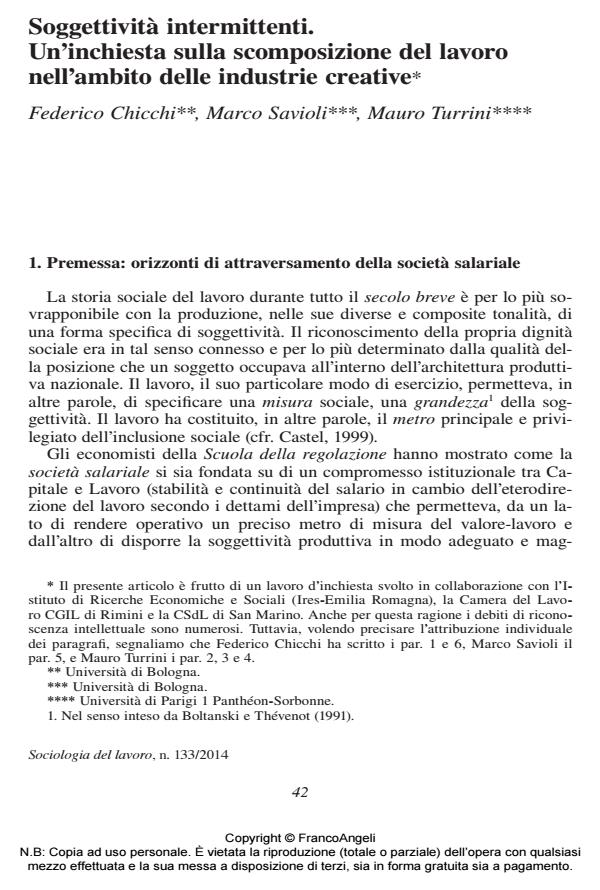Intermittent subjectivities. An inquiry on decomposition of labour in the sector of leisure
Journal title SOCIOLOGIA DEL LAVORO
Author/s Federico Chicchi, Marco Savioli, Mauro Turrini
Publishing Year 2014 Issue 2014/133
Language Italian Pages 16 P. 42-57 File size 868 KB
DOI 10.3280/SL2014-133003
DOI is like a bar code for intellectual property: to have more infomation
click here
Below, you can see the article first page
If you want to buy this article in PDF format, you can do it, following the instructions to buy download credits

FrancoAngeli is member of Publishers International Linking Association, Inc (PILA), a not-for-profit association which run the CrossRef service enabling links to and from online scholarly content.
The workers of the "creative industries" are paradigmatic subjects of the process of "work fragmentation" in the post-Fordist era. Cutting across any division between life and work, employment and unemployment, performing arts are, in many ways, a laboratory of job flexibility, where innovative contractual arrangements and professional trajectories have been advanced. Empirical data from a combined method based on both a quantitative survey and in-depth interviews with artists, technicians, and organizers working in the fields of theatre, music, dance, and video-making are used to map the multiplicity of these forms of labour, whose hybrid status is epitomized by the paradoxical condition of what we have defined as the "salaried employer". The aim is to provide a multi-layered analysis of the mutual interactions between socioeconomic conditions, career development, and cultural aspects, i.e. expectations, reputation, self-perception and social recognition of these jobs. Accordingly, these patterns of work are studied as self-employment strategies based on diversification of activities and expertise, and at the same time, as attempts to devise new spatial and temporal configurations of labour. From this perspective, precariousness emerges as a generative terrain of ambivalent subjectivities. On the one hand, the workforce is mobilized spontaneously and organized autonomously by the mobilization of desire, expression, and selffulfilment, beyond mere economic rewards. On the other hand, labour becomes increasingly intertwined with life and becomes immeasurable, since time loses its function of measurement unit for compensation (i.e. works are rewarded by fixed rates). This situation frequently leads to a spread of labour into other spheres of life and to the risk of self-exploitation. To conclude, an analysis of quantitative data shows how job and employers diversification is proportionally related to job satisfaction. Precariousness has to be considered, beyond the myth of permanent employment, as a condition of contemporary work.
Keywords: Post-Fordism, precariousness, performing art workers, subjectivities, immeasurable labour, professional career
- Behind the scenes. Networking, emotional labour and resistance in creative entrepreneurial work Emanuela Naclerio, in SOCIOLOGIA DEL LAVORO 172/2025 pp.205
DOI: 10.3280/SL2025-172010 - Destinies of artistic activity: visual artists' plural forms of employment and trade-offs in a French region Isabelle Mayaud, Laurent Jeanpierre, in SOCIOLOGIA DEL LAVORO 157/2020 pp.125
DOI: 10.3280/SL2020-157007 - Continuity, change and transitions of artistic professions in the Italian theatre industry Marco Serino, in SOCIOLOGIA DEL LAVORO 157/2020 pp.186
DOI: 10.3280/SL2020-157010 - Need for space. How artists rely on space to face precarious work conditions Damiano Razzoli, Stefano Rodighiero, Lorenzo Mizzau, Fabrizio Montanari, in SOCIOLOGIA DEL LAVORO 157/2020 pp.164
DOI: 10.3280/SL2020-157009 - Informational cognitive exploitation: Concealed relationships behind prosumers' activity on World Wide Web Agostina Dolcemascolo, Guillermina Yansen, in SOCIOLOGIA DEL LAVORO 145/2017 pp.61
DOI: 10.3280/SL2017-145004
Federico Chicchi, Marco Savioli, Mauro Turrini, Soggettività intermittenti. Un’inchiesta sulla scomposizione del lavoro nell’ambito delle industrie creative in "SOCIOLOGIA DEL LAVORO " 133/2014, pp 42-57, DOI: 10.3280/SL2014-133003